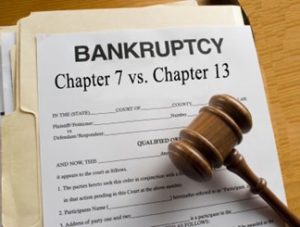Financial distress can come into your life at unexpected times for various reasons. When it does, you may have to take extreme measures to resolve it. Bankruptcy is often the last resort to overcome financial hurdles. Although the term can be scary, it may just be the best option to deal with your financial troubles. Therefore, having the right information can guide you through the necessary bankruptcy support and potential debt advice.
Why Bankruptcy Happens
Financial distress can happen to anyone, at any time, for a variety of reasons. Job loss, medical expenses, or unexpected emergencies can quickly drain your savings and leave you struggling to keep up with credit debt management. Additionally, financial mismanagement, overspending, or high-interest debt can also contribute to financial distress.
The Importance of a Budget
Creating and sticking to a budget is a critical component of avoiding financial distress. A budget helps you track your expenses and prioritize your spending. It also allows you to see how to effectively manage your cash as well as consumer credit. If you are struggling to make ends meet, a budget can help you see where you can cut back on expenses and free up more money for debt management.
Debt Management Programs
Before filing for bankruptcy, it is important to consider a reliable debt management program. These programs offered by reputable non-profit agencies such as the American Consumer Credit Counseling (ACCC) can help you repay your debts in a more manageable and affordable way.
The program works by consolidating your debts into one monthly payment. The debt management company then pays your creditors on your behalf, and often negotiates lower interest rates and fees to help you save money. Debt management programs can help you avoid bankruptcy, repair your credit, and get back on track financially.
Having said that, when it’s time to take decisive action getting the right help with bankruptcy can save you a lot of uncertainty.
What Exactly is Bankruptcy?
Bankruptcy is a process that takes place in a federal court. This process liquidates the assets of an insolvent debtor to relieve them of their liabilities. There are two types of bankruptcy: Chapter 7 and Chapter 13. Chapter 7 deals with liquidation. Chapter 13 deals with the reorganization of debt.
- Chapter 7:
- This type of bankruptcy involves appointing a Trustee who liquidates or sells some of your assets to pay creditors.
- Most of your debt will be canceled. However, you may choose to pay some creditors, usually to keep a car or home in which the creditor has a lien.
- Chapter 13:
- Chapter 13 bankruptcy involves the reorganizing of your debt into a single monthly payment.
- This payment will continue for 36 to 60 months.
- You do not have to repay all your debt, only as much as you can afford.
- The minimum payment may be affected by the property you want to keep.
- When you complete the payments, the remaining debt is discharged.
Benefits and Drawbacks of Bankruptcy
Filing for bankruptcy and liquidating your assets is not your first choice. However, if circumstances lead to this option, you must understand the pros and cons of the process. American Consumer Credit Counseling is a reputable non-profit credit counseling agency that can help you with the first steps of the process.
Some of the advantages of bankruptcy include:
- You can obtain a fresh financial start.
- If you are eligible for Chapter 7 most of your unsecured debts may be forgiven or discharged. (A secured debt is one which the creditor is entitled to collect by seizing and selling certain assets of the debtor if payments are missed, such as a home mortgage or car loan.)
- You may be able to keep (that is, exempt) many of your assets, although state laws vary widely in defining which assets you may keep.
- Collection efforts must stop as soon as you file for bankruptcy under Chapter 7 or Chapter 13.
- You cannot be fired from your job solely because you filed for bankruptcy. You can still support your family through proper financial management after bankruptcy.
On the Contrary:
- A bankruptcy can remain on your credit record for 7-10 years and can affect your future finances.
- A bankruptcy may hinder your chances of getting a mortgage or car loan for some time.
- Not all debt will be discharged. Examples of debt that cannot be discharged include child support, alimony, some student loans, divorce settlements, and some income taxes.
**You should check with an attorney on the specific categories of debt that will be allowed for discharge.
What to Consider Before Filing Bankruptcy: Getting the Right Bankruptcy Support
Before filing for bankruptcy, it is important to educate yourself on the process and have realistic expectations. Get a good picture of your finances, including a copy of your credit report. Seek the help of a bankruptcy attorney. A professional can help guide you through the process and avoid dismissal.
Enrolling in a pre-filing credit counseling course is also required before filing for bankruptcy protection. This session should include an evaluation of your personal financial situation, a discussion of alternatives to bankruptcy, and a personal budget plan.
Educate yourself in the process.
It is undoubtedly complex and overwhelming to be on this journey. Therefore, you must utilize as much time as possible to familiarize yourself with the process. You must have your expectations realistically set before getting into the deep end.
Get a good picture of your finances, including a copy of your credit report.
How does your financial portfolio look? Where do you currently stand in terms of your finances? What is your current credit score? This is crucial information to have before you begin. This process is draining. It has serious implications on your credit score and once. you do file, it will take seven years for it to recover.
Find a bankruptcy attorney. Get the right bankruptcy support.
Having a professional manage the process is key to a glitch-free process. With so much information online sometimes, consumers may be under the assumption that saving on legal fees is a better bargain. However, the guidance you get from hiring an attorney far outweighs the costs. Having someone knowledgeable on your side to guide you through this process is crucial to the success of the process. An attorney can also help you avoid dismissal. This type of guidance will help you tie up all loose ends to ensure you have a fresh start post-bankruptcy.
Choosing the right bankruptcy option.
When considering bankruptcy, it is important to choose the right option for your situation. Chapter 7 bankruptcy is a liquidation bankruptcy that allows you to eliminate most of your debt and start fresh. Chapter 13 bankruptcy is a reorganization bankruptcy that allows you to repay a portion of your debt over a period of three to five years. An attorney can help you determine which option is best for your situation.
Enroll in a pre-filing credit counseling course.
If a consumer plans to file for bankruptcy protection, they must get consumer credit counseling from a government-approved organization within 180 days before filing. This session should include an evaluation of the personal financial situation, a discussion of alternatives to bankruptcy, and a personal budget plan. On average the counseling session should last about 60 to 90 minutes.
The Importance of credit counseling
Before filing for bankruptcy, it is important to enroll in a pre-filing credit counseling course. This course will provide you with an evaluation of your personal financial situation, a discussion of alternatives to bankruptcy, and a personal budget plan. It can also help you understand the impact that bankruptcy will have on your credit and finances and provide you with the tools and knowledge you need to rebuild your financial future.
Prepare for the financial future; improve your credit rating.
Financial after bankruptcy begins at ground zero. The more bankruptcy support you have throughout the process the better you will be. The easiest way to re-establish credit is through a secured credit card from a bank. Also, create long-term goals, such as saving for a home, to help motivate you to save.
In addition to the general must-do’s here is a step-by-step guide on how to bounce back from Bankruptcy:
- Create a budget. A monthly budget is a must for any household. Budgets help avoid overspending and keep track of where your money is going.
- Set SMART goals. That means “Specific, Measurable, Achievable, Realistic and Timely goals,” “Setting goals will help you make financial achievements.
- Rebuild credit. Pay all your bills on time and pay more than the minimum on your bills.
- Start an emergency fund., Start an emergency fund to cover at least three-to- worth of expenses in case of the unexpected. This helps avoid being financially unprepared for whatever life throws at you.
- Seek financial literacy education. Talk to a financial planner who can help you avoid falling back into unhealthy money habits.
- Focus and finish. Above all, don’t act on your wants, but needs instead.
Life After Bankruptcy:
Financial recovery after bankruptcy begins at ground zero. The easiest way to re-establish credit is through a secured credit card from a bank.
Additionally, creating long-term goals, such as saving for a home, can help motivate you to save. It is important to create a budget, set achievable financial goals, pay all bills on time, and start an emergency fund.
Does Bankruptcy Eliminate Debt?
Filing for bankruptcy does not mean your debts magically disappear. It simply restructures existing debts, leaving you responsible for future payments. The process can remain on your credit report for up to 10 years and can make it difficult to obtain loans during that time. It is a public record and will be reflected on your credit report, but not permanently.
Is Bankruptcy the Best Solution for You?
The decision to file for bankruptcy should not be taken lightly. It should be based on a thorough understanding of the process as well as your financial situation. A qualified attorney can help you determine if bankruptcy is the best solution for you. The right bankruptcy support will help you determine if a successful debt management program can help instead.
In Conclusion:
Bankruptcy is a complex and overwhelming process, but with the right support, it can be a solution for those facing financial distress.
American Consumer Credit Counseling is a reputable non-profit credit counseling agency that can help guide you through the process. If you are facing financial difficulties, reach out to ACCC for more information and support.
If you’re struggling to pay off debt, ACCC can help. Schedule a free credit counseling session with us today.






